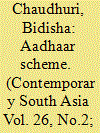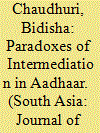| Srl | Item |
| 1 |
ID:
159867


|
|
|
|
|
| Summary/Abstract |
The burgeoning influence of liberal market economy coupled with a ‘good governance’ paradigm across post-communist and post-colonial states emphasizes a market concept of equality, while turning ‘citizens’ into ‘customers’. This trend has been further accentuated by the massive inlets of Information Communication Technologies into governance mechanisms having a significant impact on the ways of governmentality and thereby on the substance and processes of documenting citizenship. It is in this wider context of intersecting economic and political changes that this paper captures the shifting regimes of citizenship in India as manifested through the processes of Unique Identification, or Aadhaar scheme, an initiative by the Government of India that seeks to give every Indian resident a unique identity documentation. Although Aadhaar does not authenticate citizen identity, nonetheless, in its promise to build a ‘national grid’ of identity information infrastructure, it indicates a meta-structure of a new inclusion/exclusion paradigm of citizen formation in India that appears to reinvent early liberal values of civic republicanism based on property rights. Rather than assessing the merits of this scheme, this paper demonstrates how new technologies of governmentality could impact the citizenship regime in India while keeping with the demands of a growing neo-liberal political economy.
|
|
|
|
|
|
|
|
|
|
|
|
|
|
|
|
| 2 |
ID:
167102


|
|
|
|
|
| Summary/Abstract |
E-governance projects in India are often purported to minimise the role of human intermediaries. They rely on machines to curtail corruption and bring more efficiency to service delivery. However, studies have found human intermediation and its affordances to be crucial, especially in developing countries where social endowment gaps pose considerable barriers to the effective use of information and communication technologies. Human intermediation in technological infrastructure is thus invisible yet inevitable. I unravel this paradox of intermediation by examining the everyday practices of two sets of intermediaries in Andhra Pradesh and Rajasthan associated with everyday workings of Aadhaar, India’s digital biometric identity infrastructure. Looking at biometric technologies as ‘situated practice’, I draw on the notion of ‘infrastructuring’ to argue that the discretionary practices of human intermediaries in fact stabilise the technological system, anchoring it to a human infrastructure. So, as disruptive technologies such as Aadhaar are implemented, their effective usage will invariably rely on the potential agency of human intermediaries and their collaborative work practices.
|
|
|
|
|
|
|
|
|
|
|
|
|
|
|
|